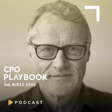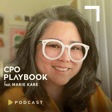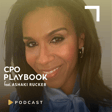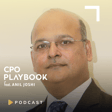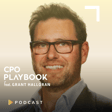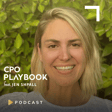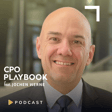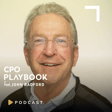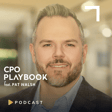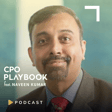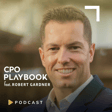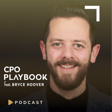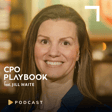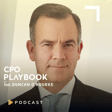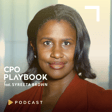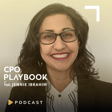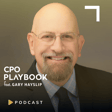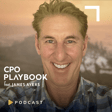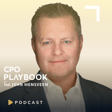Introduction to CPO Playbook
00:00:01
Speaker
I'm Felicia Shakiba, and this is CPO Playbook, where we solve a business challenge in every episode.
Impact of Succession Planning
00:00:12
Speaker
Improved succession planning could potentially boost annual gains in the large-cap U.S. equity market by a full percentage point, adding to the projected 4-5% increase estimated by Wall Street. This enhancement would translate to company valuations and investor returns
00:00:31
Speaker
being 20 to 25% higher, according to Harvard Business Review.
Leadership Transition at Adidas Canada
00:00:37
Speaker
Today, we're in for a treat, as we have both Alim and Michael here to share their experiences navigating a successful transition and succession planning at Adidas.
00:00:48
Speaker
In 2021, Alim Danji smoothly took over the reins from Michael Rossi as president of Adidas in Canada, ensuring minimal disruption to the business while gaining widespread acceptance and support. Their journey highlights effective baton passing between outgoing and incoming leadership, maintaining momentum and ensuring a seamless handover of responsibilities.
Welcoming Guests Alim and Michael
00:01:14
Speaker
Alim and Michael, welcome to the show.
00:01:17
Speaker
Thanks for having me. Pleasure to be here.
Strategic Succession Considerations
00:01:20
Speaker
Michael, can you describe the initial steps and strategic considerations that were taken when planning your succession?
00:01:29
Speaker
For me, it was a bit of an inflection point, 15 years with the company and about five years in the role as president of Adidas Canada. I was thinking ahead as to what was next for me, what I was looking for, and that's where the possibility of moving on first came up.
00:01:48
Speaker
It felt like a good time to reflect and think of other opportunities because we were just coming to the end of a five-year strategic plan. We had accomplished a lot of what we set out to accomplish as a team and as a leadership team and me personally as a leader.
00:02:04
Speaker
And so it felt like perhaps a good time to contemplate new opportunities for myself and new leadership for the company. So it was the ingredients all coming together to point towards the opportunity for change and the opportunity to do it well.
Qualities and Challenges in Leadership Role
00:02:19
Speaker
And Alim, from your perspective, what were the key qualities and experiences that were deemed essential for the next president of Adidas Canada? And coming from a Chief People Officer role into a presidential role is significant. You don't see many CPOs even being considered.
00:02:37
Speaker
On one hand, I would say regardless of it's the president of Adidas role or not any leadership role, there are capabilities around leadership, engagement, culture, as well as more of the technical or functional competencies you would have based on the market composition that we're going into are necessary.
00:02:56
Speaker
Then there's also who was in that role before and good thing, bad thing. Michael set a really high bar, which is a good thing. Bad thing for me is I had to live up to that bar and make sure that I can honor all the great work that he's done. But that's a key mark of the culture that was there. And so it was important for me to make sure that there's a lethal improvement there and that I don't deteriorate.
00:03:18
Speaker
the culture, but also I think important to note the context. The context is really important because it was in the midst of the pandemic. There were social justice movements and momentum that we were responding to. Supply chain had been disrupted. So really a perfect storm and not one that would be conducive to a transition. And most of that was done virtual. And so I think putting that as an overlay in terms of
00:03:42
Speaker
The qualities I just mentioned on top of that, I think you had to double down on empathy and building relationships without having to meet people in person and just have a level of vulnerability, quite frankly, on what you bring and what you might not be able to bring so that you can develop a team capability to support you instead of jumping in and leading and making assumptions along the way right from the start.
Handling Uncertainty and Transparency
00:04:09
Speaker
Could you discuss some unexpected challenges and how did you manage them? What specific actions did you take to meet those challenges?
00:04:19
Speaker
I think Alim set it up nicely. It was a very uncertain time. We had announced this leadership change virtually. It was already a time where people were uncomfortable with what was going on in the world around them. There was a feeling that maybe we didn't control a whole lot of what was happening and it had the potential to feel like that all over again.
00:04:40
Speaker
And so I think one of the things that the company and Aleem and I all did well was we were really transparent about what was going on. We were transparent about where I was going next. We were transparent about the timing. We were transparent about the way that we were going to almost say co-govern for a little period of time of overlap. And one of the things, there was the potential for that to be confusing because all of a sudden people are sitting in meetings with one leader who has made decisions in the past who's still in the room virtually.
00:05:08
Speaker
On the other hand, there's a new leader coming in who's asking questions and observing and trying to learn and listen. And I think the way that we work through that was we tried to be as clear as possible about who was making the call. And at the beginning, it was still me with Alim shadowing me. And then gradually, as Alim got more comfortable with the players and the issues and the business, it flipped to be inverse. It was Alim making the call and I was in the background coaching, if needed,
00:05:36
Speaker
But we tried to keep those lines clear. And I think that gave people more control, more of a sense that they understood what was going on and who was in the room. And it just sort of calmed people down and probably helped both of us through that transition period as well.
Importance of Low Ego and Support
00:05:52
Speaker
For me, everything that Michael said, I think the addition, if I could add, offer one is everything was virtual for an extended period of time and just my sort of my nature, my leadership style to connect with people, break bread, get to know them, et cetera. So doing that virtually was difficult and that was prolonged. If I recall correctly, I was in the role around January. We had some overlap, but it didn't actually meet.
00:06:17
Speaker
the leadership team in person until August. So it was very, very prolonged and unexpected in that sense. But the thing that helped us in retrospect is both of us came to this transition with low ego and it's difficult being in the room
00:06:33
Speaker
as a new leader and that vulnerability. He also mentioned I came from an HR role. There was some level, I'm sure, doubt of what's the HR guy going to do and how is he going to create value? So I think dropping the ego there and being clear about
00:06:49
Speaker
what I didn't have and also what I did have. And I had this relationship from global. I've done a lot of transformations work and thinking about how to evolve an organization. So I could lean into that. But also Michael being there, who's also a very low ego person, gave me the space to find my own voice, but also overused word right now around psychological safety for me to reach out to him
00:07:14
Speaker
If I had any questions, whether it's ahead of the meeting, texting each other during the meeting or after the meeting, I felt very supported. And at the end of the day, what I hope the team saw were two leaders that care very much about their wellbeing.
Dealing with Imposter Syndrome
00:07:29
Speaker
Alim, did you ever feel pressured to show up and prove your value? I hear you talking about having low ego, but I can only imagine that I'm sure leaders coming into a new role, they want to be able to build trust and show that their capabilities when everybody's questioning who is this leader and what are they going to do moving forward? Did you ever feel that pressure?
00:07:50
Speaker
For sure. And I don't think that is associated with just this role. Imposter syndrome, I think is a real thing. And I don't think that has ever knocked in the case with me. The role that I'm in now, I'm in an industry that I didn't have experience with. And so I'm learning along the way. So that imposter syndrome is always there. My sort of antidote to imposter syndrome is not trying to be someone you weren't.
00:08:14
Speaker
if you're open and honest and vulnerable. And I had lots of one-on-ones with my leadership team, but also one-on-ones with many others in the company. And that was transparent. We had many get to know discussions and it was clear what I had and what I didn't have. And part of what we had was a leadership team was very capable and they knew their domain expertise really well. And so that gave me some comfort that there was an exposure there and I could help them evolve and they could help me evolve.
00:08:44
Speaker
Michael, what was the extent or the role that you played to show your support for Aleem, right? Because you have people questioning a new leader and then the people that might trust you are looking to you. Do you accept to this new leader, this kind of unspoken communication that happens?
00:09:05
Speaker
I think for me, it was actually one of the principles that I always believed in and stood for and spoke for in my leadership was openness to change and how it's a positive thing. And the reality is even when I came into that leadership role six or seven years prior, I was unproven. I was an unknown. I was, for many people, not the choice that they expected.
00:09:31
Speaker
But over time, I think I was able to demonstrate to people my value, the unique perspective I brought. And so just reminding people of that story. Hey, when I came into this role, you were unsure about me and we took the time to get to know each other. You gave me a chance and look at what we've accomplished. And so give Valim that exact same courtesy and respect.
00:09:54
Speaker
and over time, you're going to learn about him and he's going to be different than me. He's going to have different ideas and that's a good thing. And I firmly believe whether it's a team, an organization, a company, leadership can get stale just over time. Even the most innovative people, sometimes it is good to have a change of leadership and perspective and tone and voice. And so just
00:10:15
Speaker
trying to show people that, hey, Aleem's going to come in and it will feel different. And you can't sugarcoat that. A new leader is going to feel different. They're going to have a different style, different priorities, different communication, all of that. So just trying to let people see that's okay, that's going to be good,
Moving On and Achieving Closure
00:10:32
Speaker
adapt, be open. And then certainly Aleem picked that up quickly and started to build trust with people once he got into the role.
00:10:40
Speaker
I think that's really important point that you made. Did you, Michael, during the transition, what were some of the main challenges that you faced? How did you approach solving them with Aleem support?
00:10:55
Speaker
The one thing, and again, it was really frustrating being virtual because you go through a situation like this where I loved the company, I loved these people, I loved the team, I missed them, missed seeing them in person, and then you announce a major life change that you're leaving the company to move on to something else.
00:11:15
Speaker
And what was funny was you were missing those opportunities at the coffee machine just to check in with people. And people were trying to check in with me. They wanted to know, was I okay? Was this my decision? Was there some big conspiracy theory? In the absence of that connection, people might start to create their own versions of the story.
00:11:36
Speaker
And so I think just over time being able to show people in whether it was one-on-one conversations, group chats, just to show them first of all, hey, I'm moving on and moving towards my dream of becoming a coach. I'm okay. I'm really excited about this and it's a fantastic move. I think that helped people.
00:11:55
Speaker
But I'll be honest, it also helped me. Like this was a big change for me. And so being able to discuss that with people and let them see that over time, I think we all got a little more comfortable with the change. It was also hard, quite frankly, after 18 years with the company, you want that sense of closure.
00:12:12
Speaker
And so many people changed roles during COVID and left companies and left really deep relationships. And I believe to this day, some people still don't have that full closure. I was really fortunate. My team organized a virtual send off for me.
00:12:28
Speaker
That was beautiful. I actually just a couple of weeks ago, it was three years to the day and I went back and watched video from that. And it was just beautiful to be able to get some of that closure. It was virtual, but to be able to hear a little bit about the impact I had, that helped me get the closure I needed to move on. And then I think between Aleem and I just finding our way in terms of when was it the right time for me to step back? When was he comfortable to start making the calls?
00:12:56
Speaker
And I remember that was a very fluid, organic way that Aleem and I worked on it. We'd talk every week and we'd prepare for the calendar and then it just gradually became obvious. He didn't need the check-in calls. He was good and it was time to let go of the reins. And so I think Aleem mentioned that ego-free approach. I think we both wanted the business to be protected and the people to be protected. And wherever we landed on that was secondary. And so it actually worked quite well.
00:13:26
Speaker
So the values that you both had was really important to the transition because there was that consistency that you both had, those things. I think so, yes, for sure.
Building Trust and Quick Wins
00:13:38
Speaker
Alim, as the incoming president, how did you approach gaining the trust and acceptance of Adidas employees and other key stakeholders? And considering obviously you've been there for quite some time prior to you stepping into this role, but how did you gain that trust as the president at Canada?
00:13:55
Speaker
I was with the data's in Germany that had office for a couple of years. And I think during a very tumultuous period, the pandemic, other things that were happening with our organization globally. And so I worked very closely with the board and some of our key leaders and developing those relationships were going to be an asset as I think about what's next for a country with so much potential and how do we leverage those relationships. So all that capital
00:14:22
Speaker
that was developed in Germany was going to translate and hopefully monetize for the team in Canada. But the trust, I think, comes from the approach that was taken as everything that Michael and I did together already set me up, I think, in some form for success.
00:14:37
Speaker
there was a sort of implicit endorsement also the way that Michael and I had worked together. And I think it's important to recognize that it's very unusual. It's not usually the case where we have two leaders that have a very graceful and elegant transition. And so we should recognize that's unique.
00:14:57
Speaker
But in terms of building the trust, I am a huge fan of listening sessions. And partly because there was no coffee machine, only my kids were at the coffee station in the kitchen. There was no cooler that I could go to to absorb the culture directly and have those conversations. So I had to overcompensate by scheduling a lot of listening sessions.
00:15:16
Speaker
and just hearing from people. And I said, look, this is not about me jumping in with solutions. This is purely about hearing and listening, listening again and understanding what the themes are. And I think that was very cathartic to people because it ensured that I was there to be a servant leader and understand where they needed to go, what ideas they have, et cetera, rather than me coming in with a playbook.
00:15:38
Speaker
Frank, they didn't have a playbook. There was no template of getting through the pandemic. The Canadian laws were shifting around closure and whatnot. There was no template on how to get through the supply chain. So we had to do this together. I think the trust came from listening mainly.
00:15:53
Speaker
and then being open and vulnerable and authentic. And then I think finding some quick wins along the way, where every little quick win that you can get for individuals, whether it is around an ERG and what the ERG feels is important and how do we support them, or whether it's something small in the office layout, or it's a big product initiative because Canada wasn't able to get the direct selection of the category you wanted to introduce and bigger countries were getting that priority.
00:16:21
Speaker
And being able to phone a friend in Germany helped accelerate that. I think one by one, those quick wins helped build more trust and confidence.
00:16:30
Speaker
Organizational culture often plays a significant role in leadership transitions. And I love that you talked about servant leadership as well. And I'd want to go back and ask you what that actually means to you, because it does, I think, play a big part of organizational culture, but what aspects specifically of Adidas' culture were prioritized to ensure a smooth changeover?
00:16:56
Speaker
Yeah, I don't think that there was a playbook. I'm pretty sure there wasn't a playbook that we got from
Transparency and Care in Leadership Change
00:17:01
Speaker
corporate. This was Michael and I connecting forces and saying, what do the people need? And then what do we each need in order for us to be successful for the team? But I think the values were consistent. So we said earlier in terms of our desire for graceful transition, making sure we put people first, not undoing some of the big things that Michael and the team have done around.
00:17:22
Speaker
And just treating the team with respect, we also knew that in Canada, there were some challenges of being in a market, a smaller market next to the US, for example. And so how resources get allocated, et cetera, how do we make sure that we do what's right for the country?
00:17:38
Speaker
And we had good alignment there and we were able to prioritize some of the important aspects that we wanted to continue, but also start to percolate what needed to shift going forward in the culture. But being mindful that we didn't want to press play right away on what needed to shift until I felt comfortable that I've heard from as many employees as possible and could better refine my thinking around where the culture needed some evolution.
00:18:05
Speaker
I think from my standpoint, we have been through a lot of change in the years leading up to the changeover from me to Aleem. We transform the business and evolve the culture all the way along. And to me, the hallmarks throughout that, number one, was always genuine care for our people. We knew we had to do some tough things to fix the business, but we always put people first.
00:18:28
Speaker
And I think we carried that through this transition as well. And part of that was the second piece, which was transparency. When you lead through change, I think it's just so important to be open. And if you have to do difficult things or if things need to change, just being open and honest with people about what's going to happen and why. And people are adults. Employees are adults. They're responsible, mature people who can make their own decisions and respond accordingly.
00:18:54
Speaker
We treated people with that respect. We were transparent about what was going to happen. So it wasn't a surprise. And I think that made what could have been an uncomfortable situation much more comfortable, if not really comfortable, because I think they saw right from Aleem and I, we were being really open about how this was going to work. We were sitting in meetings together and it wasn't awkward. Some leaders might have had a hard time in that scenario. We were more than fine. And I think that set the tone.
00:19:22
Speaker
and gave people a comfort level to move forward as well. It sounds like you guys did a lot of things really well.
Reflection on Transition Process
00:19:30
Speaker
What did you not do so well in this transition? What were the things that bubbled up that maybe you took a misstep here or there? It couldn't have been all perfect.
00:19:41
Speaker
I don't know that I'd call it a true mistake, but I think we were extremely generous with the amount of time we allowed for the transition and maybe some of the dialogue, and maybe we were surprised by how fast we actually were ready to move forward. I think with Alima and I, we had planned quite some time for these shadowing meetings and one-to-one conversations, and it just became apparent fairly quickly through the process that
00:20:10
Speaker
Okay. People have responded. They understand where we're at. They're starting to move forward with Aleem's leadership. And we actually don't need to have all these touch bases and we actually can go let go a little bit sooner. So I don't think it was a mistake. I think it was great. We had the luxury to allow that time. And I think it was great. We also recognized we didn't need as much and could move forward faster and hand things over to Aleem.
00:20:34
Speaker
Yeah, I would agree wholeheartedly if there was one do over, which was not within our control, it's not doing a change during a pandemic or a supply chain disruption. But other than that, I think the transition went as, as best as it could probably could. And I don't look back to say we've had any regrets or anything that we would necessarily do differently in that sense.
00:20:58
Speaker
What are the key lessons that you've learned from this presidential succession that you think could benefit other organizations undergoing similar changes?
00:21:13
Speaker
I would say, and I think we've recognized through this conversation, we were somewhat unique in terms of having the luxury of time in our scenario. But I do think that when you make time for a graceful and well thought out transition process, it allows for some communication, some transparency. It allows for people to catch their breath and understand the change that's about to take place.
00:21:40
Speaker
And I don't want to overemphasize the importance of a leader, an individual leader. But a change in leadership is a big change. And in some ways, it is almost like a loss if the leader has been with the team for quite a while. And so I think our process allowed people to process that and to acknowledge what was going away and to then get comfortable with what was coming in. And I think whether you have lots of time or a little time, I would say one thing is just
00:22:10
Speaker
giving people that space to acknowledge and feel what they're feeling about the change and recognize the impact and then start to move forward again, that's really critical. And I would also say that an open process where people are very clear on timing and details and what to expect, that can help them gain some comfort with what can be an uncomfortable position, especially if younger employees may not have been through a leadership change
00:22:38
Speaker
in their career. It may be the first time they're experiencing it. And I think facts and knowledge really do help people become more comfortable with what's going on around them.
00:22:47
Speaker
So if I were to reflect back and say if we had delivered a successful transition, which I believe we did, then how do we codify
Creating a Transition Playbook
00:22:56
Speaker
that? How do we create a playbook out of that so that other leaders could benefit? It probably starts off first with the two leaders agreeing on some principles on what's most important. And I think some of those principles come from where's the risk?
00:23:08
Speaker
And intellectually, because we were on the same sort of page, I think if we had done this exercise, we would have probably listed the organizational risk because people were first, how do we make sure that they're treated in the best way possible, we managed to change. Then of course, there are some major customers and how do we make sure that those customers are treated with the respect and what risks are there and then what are some other risks. And once you understand the risk assessment, you can create your principles on how you two are going to lie.
00:23:37
Speaker
I think having that done then gives you both some comfort around how you move forward because you don't want to trip up in front of others. You want to be as much as possible coordinated in your approach for communications, supporting the strategy that's currently in place, and supporting each other during the various stages of transition.
00:23:56
Speaker
The second is, I think the luxury of time is important, but I certainly found it very reassuring that we had a prolonged period of time. So it gave me the comfort that the training wheels were there. They were available for me, but that also had the ability to take them off without offending anybody. And then the phone of friend still stays. Even if it was a year later and I needed to ask Michael a question, I know that Michael would take the call or text message or whatever.
00:24:24
Speaker
So I think understanding the timeline and how you're going to socially contract with each other pre, during, and post change.
Leveraging Diverse Background in Leadership
00:24:32
Speaker
How much time was there during the transition?
00:24:36
Speaker
I was living in Germany first, so the discussion started before the actual date where I stepped into the role. And Michael and I had lots of conversations, just understanding the business, what has worked, what hasn't worked. We did a talent map, et cetera, et cetera. And then there was the January, and I'm going off of memory now, Michael, to keep me honest here, I think January
00:24:56
Speaker
Formally, I stepped into the role, but it was still virtual because I was living in Germany. So awkward being leader of Canada in Germany. I didn't make the move to Canada until end of March, but we were still in closure. So it doesn't matter where I was living. I could do the role. And I think that the transition saw itself through until end of April. And then the training reels came off.
00:25:18
Speaker
When you stepped into Canada, didn't people have some suspicion, someone coming from another country to lead Canada? What was that pushback or resistance? Was there any of that?
00:25:30
Speaker
Not really, just because I am Canadian. And so I've just been traveling and working in different parts of the world. And I think that that was one of the comforting points was I know the country, the market really well. And at the end of the day, one parallel was that Canada is such a diverse country and the markets we serve
00:25:51
Speaker
are reflected in our consumer base. So as we think about the moments that matter the most for Canadians and where it even shows up, that was pretty powerful. And I'd done a lot of work in the DEI space. So it's an interesting connection where my work in the HR space was able to translate into how do you commercialize that. And it was a very authentic way of doing it. We didn't do it just for the sake of diversity. It's actually serving diverse markets. And so it worked out quite well in that sense.
Conclusion and Teaser for Next Episode
00:26:17
Speaker
Well, Michael, Alim, thank you so much for telling your stories and taking us on this journey. I'm sure many organizations have this same challenge around transition and it sounds like you've done it beautifully. So thank you for sharing and being here today. Thank you for the opportunity. My pleasure. Thank you.
00:26:40
Speaker
That's Alim Danji and Michael Rossi, both former presidents of Adidas Canada. Alim now holds the position of Chief People Officer and Executive Vice President at Equinox, and Michael Rossi has founded Voce Leadership.
00:26:57
Speaker
If today's episode captured your interest, please consider sharing it with a friend or visit cpoplaybook.com to read the episode or learn more about leadership and talent management. We greatly appreciate your rating, review and support as a subscriber. I'm Felicia Shakiba. See you next Wednesday and thanks for listening.

